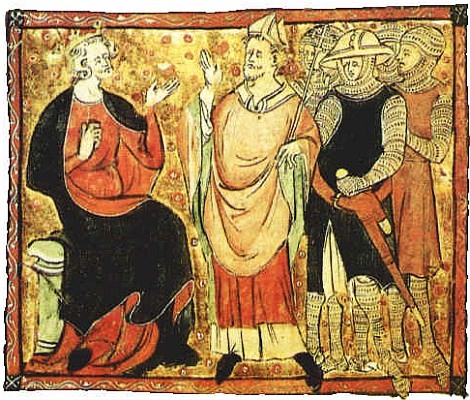Of Engelond to Canterbury they wende,
The holy blisful martir for to seke,
That hem hath holpen, whan that they were seke.
- Canterbury Tales, General Prologue
Canterbury, Canterbury, Thomas à Becket, everybody loves a martyr!
- Sheriff Vaisey, BBC Robin Hood, 2006.
Today is, as every inhabitant of the Middle Ages would have known, the feast day of Thomas à Becket, Archbishop of Canterbury, killed in Canterbury Cathedral on 29th December 1170 by four knights of Henry II. The king and the Archbishop had been at odds as to whether the king had jurisdiction over the church. According to legend, when the Archbishop refused to sign the Constitutions of Clarendon, which would have restricted ecclesiastical powers, Henry cried "Who will rid me of this troublesome priest?" - an invitation which the four knights took literally.
 |
| Henry II and Thomas à Becket, via |
This is an eyewitness account of the Archbishop's murder, by one Edward Grim, displaying the usual medieval flair for the dramatic:
...The wicked knight leapt suddenly upon [the Archbishop], cutting off the top of the
crown which the unction of sacred chrism had dedicated to God. Next he
received a second blow on the head, but still he stood firm and
immovable. At the third blow he fell on his knees and elbows, offering
himself a living sacrifice, and saying in a low voice, 'For the name of
Jesus and the protection of the Church, I am ready to embrace death.'
But the third knight inflicted a terrible wound as he lay prostrate. By
this stroke, the crown of his head was separated from the head in such a
way that the blood white with the brain, and the brain no less red from
the blood, dyed the floor of the cathedral. The same clerk who had
entered with the knights placed his foot on the neck of the holy priest
and precious martyr, and, horrible to relate, scattered the brains and
blood about the pavements, crying to the others, 'Let us away, knights;
this fellow will arise no more...
Thomas was immediately hailed as a martyr and the King was not popular (he later performed public penance - whether out of genuine remorse or political astuteness is debatable...) The Archbishop's tomb quickly became a drawcard for pilgrims (the medieval equivalent of tourists!) - famously, the pilgrims in the Canterbury Tales are all on their way to the shrine of St Thomas.
| The site of Becket's murder in Canterbury Cathedral, via |
Thanks almost solely to Thomas à Becket, medieval Canterbury became the pilgrimage capital of England. This seems rather to have annoyed its northern counterpart, York; for most of the Middle Ages there was a rather undignified struggle between the two sees, each seeking supremacy and one-upmanship over the other. Rivalry between the north and south of England appears to go a long way back!
If Canterbury's pet saint was Archbishop Thomas, York's was Archbishop William, who died in 1154 (reportedly from poisoned wine in his chalice). Following his burial in York Minster, rumours of miracles abounded, including the miraculous preservation of his body in one of the Minster's many fires (a miracle which was later mirrored almost exactly at Canterbury with St Thomas' body). William's cult, however, only really took off from the 1170s onward - at exactly the time of Thomas à Becket's murder and the outpouring of veneration which followed.
It is probable, however, that the sudden renewed interest in St William at York was not coincidence at all, and that York began to play up its association with William in response to events at Canterbury. The latter, finding itself suddenly the centre of pilgrimages from all over the country, no doubt thought itself immensely important. York must have resented Canterbury and Canterbury's saint being the centre of attention; the sudden blossoming of the cult of St William was surely at least partly an attempt to redress the balance. If this was indeed so it was only partially successful; York did become a popular tourist, sorry, pilgrimage destination, but never to the same degree as Canterbury.

No comments:
Post a Comment